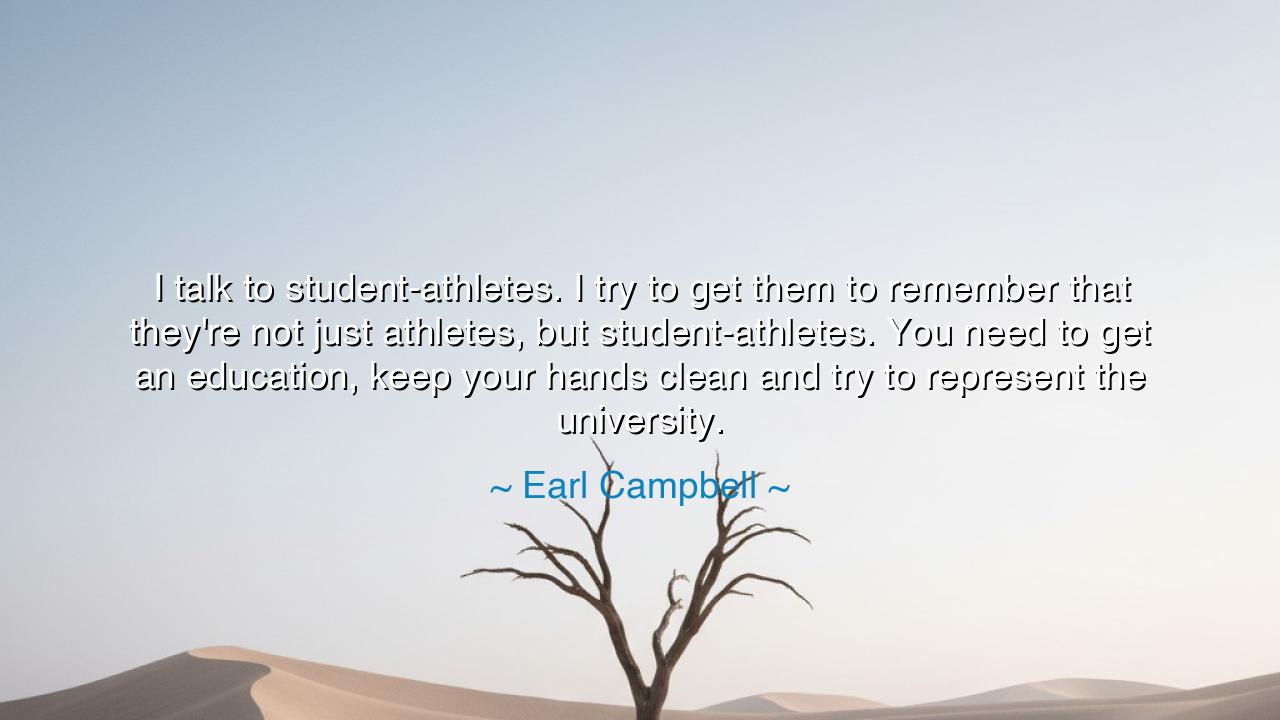
I talk to student-athletes. I try to get them to remember that
I talk to student-athletes. I try to get them to remember that they're not just athletes, but student-athletes. You need to get an education, keep your hands clean and try to represent the university.






The words of Earl Campbell, the great “Tyler Rose,” carry the wisdom of one who has wrestled with both triumph and struggle, and emerged with humility intact. When he says, “I talk to student-athletes. I try to get them to remember that they’re not just athletes, but student-athletes. You need to get an education, keep your hands clean, and try to represent the university,” he speaks not merely as a man of sport, but as a teacher of life. His voice rises from the fields of discipline and echoes into the hearts of all who strive for greatness. For in these few words lies an eternal truth—that strength of body is nothing without strength of character, and that glory fades quickly when not anchored in wisdom.
Earl Campbell himself was a symbol of power—his legs like tree trunks, his will unyielding as iron. Yet, beyond his legendary career in football, he understood that the victories of the field are fleeting if the mind and the soul remain untrained. The athlete who forgets he is a student becomes like a warrior who polishes his sword but lets his spirit rust. Thus, Campbell’s reminder is more than advice—it is a call to balance, to integrity, to remembering that every gift demands discipline, and every achievement carries responsibility.
This truth is as old as civilization itself. The Greeks, who first honored both mind and body, spoke of kalokagathia—the harmony of the beautiful and the good. Their Olympic champions were not only competitors but philosophers; they trained their bodies to mirror the excellence of their minds. In that sacred balance lay the seed of greatness. When education and athletics walk hand in hand, they form the full measure of human potential. But when one is neglected, imbalance leads to downfall. So it was then, and so it remains now.
Consider the story of Pat Tillman, the American football player who, in the height of his career, left the stadium lights to serve his country. His strength was not only physical—it was moral. He understood that the uniform one wears, whether on the field or in service, carries meaning. He lived what Campbell taught: to represent something greater than oneself, to play not only for victory but for honor. Tillman’s sacrifice reminds us that the true champion is not the one who scores the most points, but the one whose life is guided by principle.
When Campbell speaks of keeping one’s hands clean, he means more than avoiding wrongdoing. He speaks of purity of intent—of striving for success without corruption, of walking with dignity when temptation whispers. The young student-athlete, surrounded by the noise of fame and expectation, must remember that his actions reflect not only on himself but on his family, his community, and his university. In this, Campbell’s words rise beyond sport and touch the sacred code of honor that governs all who lead and inspire.
But what, then, of the education he insists upon? It is not merely the learning of facts and figures—it is the shaping of conscience, the sharpening of judgment, the awakening of understanding. For the body, no matter how strong, will one day falter. But the educated mind and noble heart endure, guiding a person through every storm. Education is the torch that lights the path when the cheers of the crowd have faded, when the scoreboard no longer matters. It is the true victory—the one no injury, no defeat, no time can ever take away.
Therefore, let this lesson be written upon your heart: Be more than what the world calls you. If you are an athlete, also be a scholar. If you are a competitor, also be a servant of truth. Guard your integrity as fiercely as you guard your goal. Remember always that you represent something larger—your family, your school, your community, and the very ideals that sustain our humanity. Greatness is not measured by strength alone, but by wisdom, humility, and the courage to walk rightly even when no one watches.
So, to the youth who run, who strive, who dream: take Campbell’s words as your compass. Train your mind as you train your body. Keep your hands clean, your heart humble, and your spirit noble. For when the final whistle blows, when the lights dim and the crowd disperses, the true measure of victory will not be found in trophies—but in the kind of person you have become.






AAdministratorAdministrator
Welcome, honored guests. Please leave a comment, we will respond soon